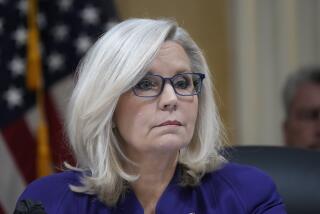Cheney Book: Bush and Cheney differ on 9/11, Iraq
Reporting from Washington â Former Vice President Dick Cheney promised last week that his new memoir would have âheads exploding all over Washington.â
As the book hit stores Tuesday, it was unclear how many heads had exploded, but there was certainly some head-scratching.
Contained in the 500-plus pages of âIn My Time: A Personal and Political Memoirâ are Cheneyâs accounts of crucial moments during the eight-year administration of President George W. Bush. In at least two of those accounts Cheneyâs story doesnât match up with the versions told by Bush in his book, âDecision Points,â which was published last fall.
Letâs start with the frenzied hours after the Sept. 11 terrorist attacks.
Bush first learned of the attacks while he was visiting an elementary school in Florida. Cheney was in Washington at the time. The Secret Service ushered Bush onto Air Force One and stationed Cheney in the White House bunker. The two spoke several times by phone in the hours following the attack.
Bushâs account makes it sound like he was running things from 45,000 feet aboard Air Force One. But Cheneyâs version suggests it was the vice president who was calling the shots â from telling Bush what he needed to do to telling him where he needed to be.
Bush wrote that he called Cheney as Air Force One took off from Florida.
âI told him that I would make decisions from the air and count on him to implement them on the ground,â Bush wrote. âI told Dick that our pilots should contact suspicious planes and try to get them to land peacefully. If that failed, they had my authority to shoot them down.â
Cheney, however, tells a slightly different version, one that suggests it was he who initiated the discussion. Bush âapproved my recommendation that [American fighter jets] be authorized to fire on a civilian airliner if it had been hijacked and would not divert,â Cheney wrote.
Bush and Cheney also differ over whose decision it was to keep Bush out of Washington as events continued to unfold that morning.
âWhen the president came on the line, I told him that the Pentagon had been hit and urged him to stay away from Washington,â Cheney wrote. âI understood that he didnât want to appear to be on the run, but he shouldnât be here until we knew more about what was going on.â
Bush, however, blames Andy Card, his then-chief of staff, and the Secret Service for blocking him from returning to Washington.
Card and Eddie Marinzel, who led Bushâs Secret Service detail that day, âstarted to throw cold water on the idea,â Bush wrote. âThey said conditions in Washington were too volatile, the danger of attack too high.â
As Bush tells it: âI told them I was not going to let terrorists scare me away. âIâm the president,â I said firmly. âAnd weâre going to Washington.â They stood their ground.â
Both Bush and Cheney say that they were âin the fog of warâ at the time, which could explain the discrepancies. Yet at times, their accounts of the way things went down that day are almost identical.
The two agree, for example, that after Cheney gave an order to shoot down a plane that was believed to be hijacked, Deputy Chief of Staff Josh Bolten suggested that Cheney contact Bush to, as Bush put it, âensure that the chain of command was respected.â
âWhen the president came on the line, I told him about the shootdown order,â Cheney wrote. The shootdown never occurred.
On the war in Iraq, Bush and Cheney again offer differing accounts of a crucial moment.
On March 19, 2003, Bush and his national security team were gathered in the Oval Office reviewing intelligence that suggested Saddam Hussein would be spending the night at a complex outside Baghdad.
While the war was already in motion at that point, attacking the complex would require a change in plans. Bush worried that the intelligence might be bad, but eventually ordered the strike.
âI turned to the team gathered in the Oval Office and said, âLetâs go,â â he wrote.
But thatâs not how Cheney remembers it.
âWe thoroughly discussed the pros and cons,â Cheney wrote, âand eventually the president kicked everyone else out of the Oval Office, looked at me, and said, âDick, what do you think we ought to do?â I told him I thought we should launch.â
More to Read
Sign up for Essential California
The most important California stories and recommendations in your inbox every morning.
You may occasionally receive promotional content from the Los Angeles Times.










